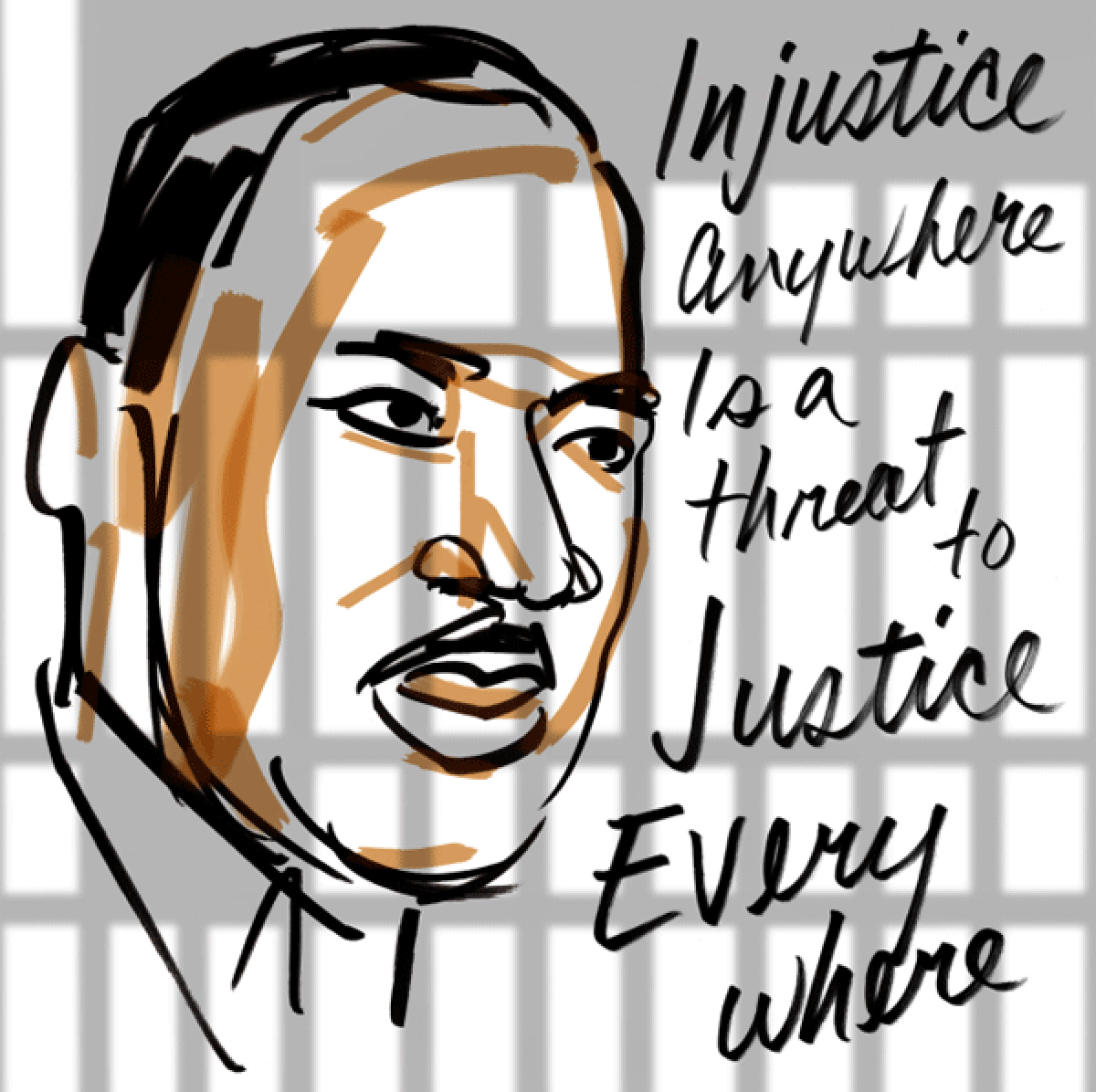King’s Easter epistle on civil disobedience

- Share via
This year is the 50th anniversary of the Rev. Martin Luther King Jr.’s decision to violate an injunction forbidding him to pray, sing or march in public in Birmingham, Ala. On Good Friday 1963 (which fell on April 12 that year), King led a march from the 16th Street Baptist Church (where four black children would be killed in a bombing five months later), heading toward City Hall. He was almost immediately arrested, charged with violating a court order and taken to the Birmingham jail.
As he sat in jail on Easter Sunday and the days that followed, he wrote his “Letter From Birmingham Jail” to a group of moderate white clergymen who had issued a “call to unity” to civil rights activists, urging them to pursue legal remedies rather than engage in nonviolent protests. Anyone who hasn’t read King’s response lately (and most of us who have) would benefit from spending a few minutes reading it this Easter weekend.
King had journeyed to Birmingham to help lead an economic boycott of segregated stores, where blacks could shop but not work or eat. As he put it, “I am in Birmingham because injustice is here,” and “injustice anywhere is a threat to justice everywhere.”
The campaign used marches, lunch counter sit-ins, pray-ins at white churches and picketing to fill the jails with nonviolent protesters. But by Holy Thursday, the campaign was faltering, with too few volunteers available to subject themselves to arrest. When on the eve of a planned Good Friday march a local court granted the city attorney’s secret request for an injunction, the consequences of demonstrating soared. Protesters would be subject to long sentences for contempt of court.
On Good Friday morning, King had to decide whether to postpone the demonstration. He was expected to preside over Easter Sunday services in his own church, Ebenezer Baptist in Atlanta. His lawyer warned him that if he marched, he would probably still be in jail Sunday. His father and some of his aides urged him to comply with the order and go home. “I don’t know where the money [for bail] will come from,” he explained to them, “but I have to make a faith act.” Andrew Young later described the moment as the “beginning of [King’s] true leadership.”
Upon his arrest, the civil rights leader was initially placed in an unlighted, unfurnished solitary confinement cell, but on Monday he was moved to a better cell and given a copy of the statement from local clergymen, which assailed the “outsiders” who came to Birmingham without cause to “incite hatred and violence” through “extreme measures.”
King’s eloquent response still resonates today, both for its story of sacrifice and its profound discourse on the meaning of equality. In the 7,000-word letter, the civil rights leader confronted the argument that he was hypocritical in demanding that white leaders obey the Supreme Court’s decisions on desegregation while urging civil rights activists to violate laws against demonstrating. Can we pick and choose the laws we obey? Yes, he argued. “There are two types of laws: just and unjust,” King wrote. “I would be the first to advocate obeying just laws. One has not only a legal but a moral responsibility to obey just laws. Conversely, one has a moral responsibility to disobey unjust laws.”
King’s discourse on legal equality rejected the argument that laws favoring the majority were no different than laws protecting a minority. Or, as Justice John Paul Stevens has written, equality does not require us to ignore “the difference between a ‘no trespassing’ sign and a welcome mat.” (Gov. Jerry Brown made the same argument in January regarding school funding for poor neighborhoods. Brown cited Aristotle for the proposition that treating unequals equally is not equality. He might have cited King as well.)
While the Jim Crow laws King protested have long fallen, his words still have profound relevance. They call out to us today, for example, as we confront claims that any affirmative efforts to use race in crafting remedies for racial inequality violate the principle of equality. He saw things differently. “Law and order exist for the purpose of establishing justice,” he wrote, “and … when they fail in this purpose, they become the dangerously structured dams that block the flow of social progress.”
Read the full text of “Letter From Birmingham Jail.”
David B. Oppenheimer is a clinical professor of law at UC Berkeley.
More to Read
A cure for the common opinion
Get thought-provoking perspectives with our weekly newsletter.
You may occasionally receive promotional content from the Los Angeles Times.









